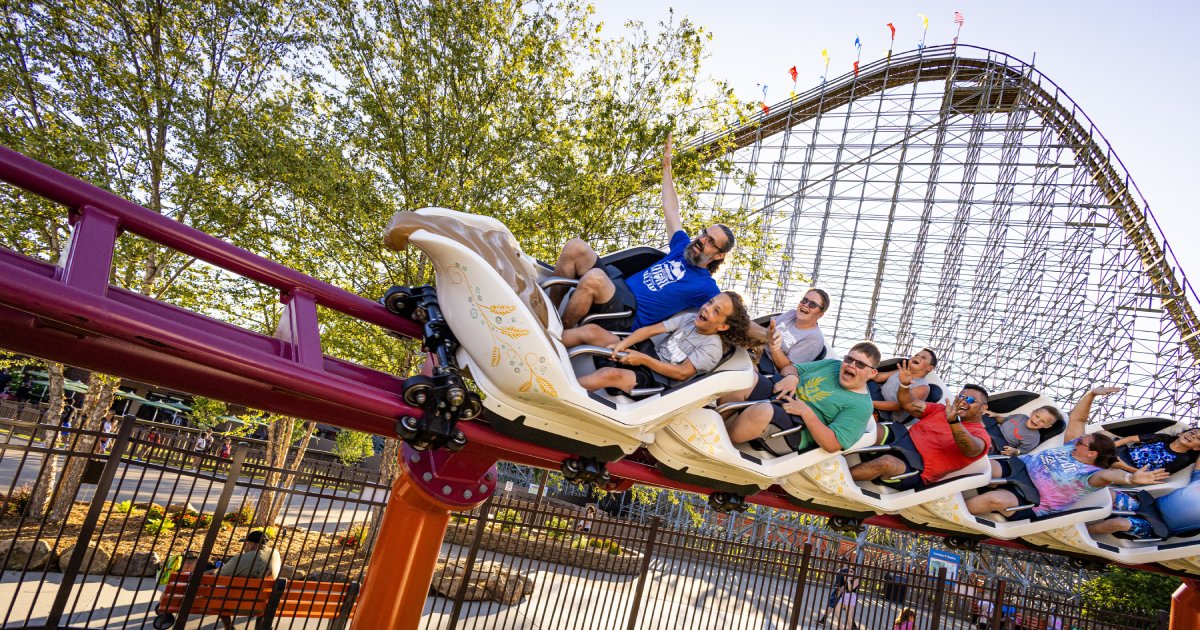Theme Parks, Entertainment Centers Look to Licensing

By Mark Seavy
As theme parks and entertainment centers compete with videogames, smart phones, streaming, and other services for consumer attention, licensed brands are becoming a major attraction.
That shift from what was largely a non-licensed business to one in which licensed IPs are key to many attractions’ strategy was central to last week’s International Association of Amusement Parks and Attractions (IAAPA) show in Orlando, FL. And while many operators and ride manufacturers continue to build and develop projects based on original properties, the shift to licensed brands comes as the pace of construction and the level of competition increases.
Six Flags Entertainment, for example, unveiled plans to open its Qiddiya, Saudi Arabia park, which has 28 rides, on December 31. The Qiddiya region will also feature the first licensed Dragon Ball Z themed section, a 500,000-square-foot park with 30 attractions.
Premier Rides built the licensed West Coast Racers attraction for Six Flags Magic Mountain in Valencia, CA but also developed the non-licensed Alpen Fury ride that opened in July at Wonderland Park in Mississauga, Canada. However, 50% of Premier’s meetings at the recent IAAPA show involved branded IPs, double the amount from previous years, CEO Jim Seay said.
“People’s attention is captured in so many different ways now, whether its gaming or a cellphone, that I think parks are realizing they are competing for attention and a powerful franchise can boost revenue by 10-20%,” Seay said. “Licensed IP is even more so now another element in the ride, and it is from a broad spectrum of IPs because the business has become multi-generational. You can also wrap the IP around food and beverage so that those that aren’t on the ride can still be part of the experience.”
The surge of licensed IPs comes as attractions refresh and, in many cases, reinvent themselves to create more immersive experiences with the quality of storytelling that is being sought by younger parkgoers, industry executives said.
Six Flags, for example, is overhauling its Six Flags over Texas park in Arlington, TX, to update the six sections. The most recently included area, Rancho de la Tormenta, will feature a new rollercoaster and restaurant along with a retail store that will sell internally developed collectibles, said Clayton Lawrence, Corporate Creative Producer at Six Flags.
And Six Flags, which merged with Cedar Fair Entertainment, is also preparing a new brand licensing strategy for the combined company. It will maintain licensing agreements with Peanuts Worldwide and Warner Bros. Discovery, but also focus on building stories behind internal IP such as Siren’s Curse and Iron Dragon (Sandusky, OH), Lawrence said.
While Six Flags’ licensing agreements are expected to remain unchanged, any new attractions “will fit naturally into the parks as we create our own stories,” Lawrence said. “We will invest in children’s areas but also have our own traditions.”
At Six Flags King’s Island in Mason, OH, the park operator will relaunch the Phantom Theater attraction, which had its first run between 1992 and 2002, using a Sally Dark Rides’ coaster featuring animatronic figures. The changes come as Six Flags closes some of its 42 attractions, including a Six Flags America in Bowie, MD that shut on November 2.
Amid these changes, there have also been delays.
Mattel, for example, has postponed the opening of the Adventure Park in Glendale, AZ, originally scheduled for late 2024, as the surrounding Vai Resort finalizes details. The Hot Wheels rollercoaster, which was manufactured by Chance Rides, is scheduled for testing in the coming weeks, said Julie Freeland, VP of Global Location-Based Entertainment at Matetl. A second park proposed for Bonner Springs, KA, which initially was set to open in 2027, has also been delayed. The entire project, which includes the park, is required to open by 2031.
Additionally, Three Five Group’s entertainment complex American Dream—which contains Nickelodeon Universe, The Gameroom Powered by Hasbro, and Angry Birds miniature golf—struggled as a tax assessment by the Borough of East Rutherford, NJ, lowered its value to $2.5 billion (down from $3.3 billion a year early).
Revenue from the 3.5 million-square-foot mall hit $650 million in 2024, up 18% from a year earlier, but short of a $2 billion first-year projection made in 2017. The mall opened in fall 2019 but was hampered by the global pandemic. The Nickelodeon Universe theme park is being revamped to add a 5,000-square-foot retail store that will feature licensed and internally developed products, said Marcy Davis, SVP for Attractions & Entertainment at American Dream. Another 2,000-3,000 square feet is being added to the Sesame Street section to accommodate more characters, Davis said.
“There is a continued emphasis on licensing to bring people in,” said Matt Proulx, SVP of Global Experiences at Hasbro. “If you launch a new IP, it is hard and cumbersome and it is a commitment you must make for an extended period. Consumers want things that are more immersive and tell a little bit of a story. There is a lot of IP out there that wants to be in this business, and there is a lot of IP that can play in this space. But how it comes to life is important.”




